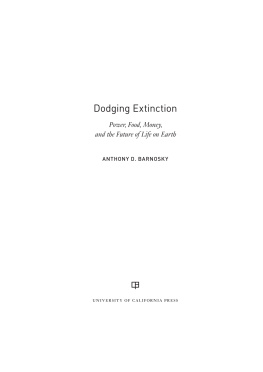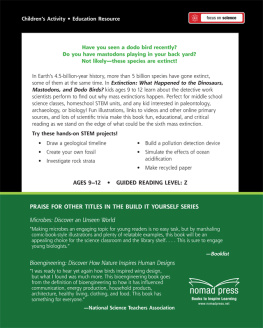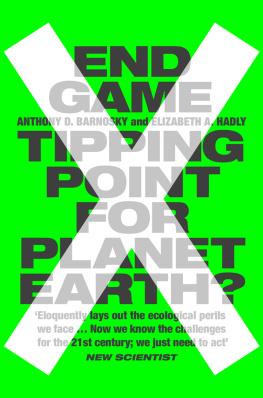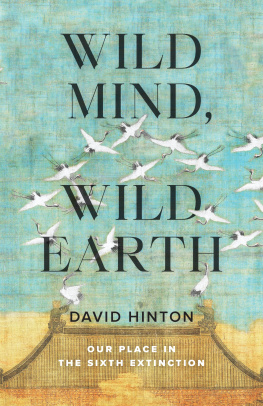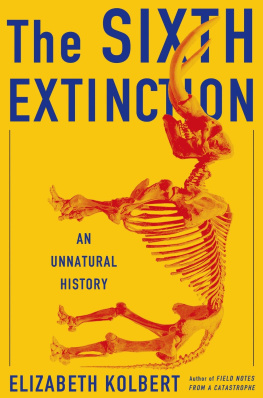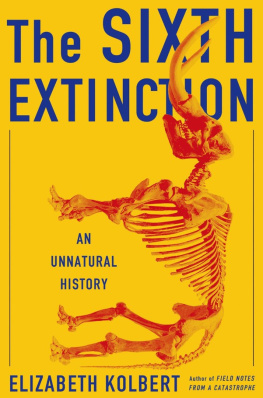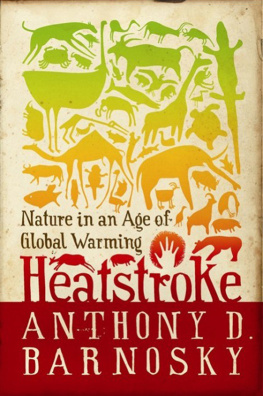ANTHONY D. BARNOSKY
University of California Press, one of the most distinguished university presses in the United States, enriches lives around the world by advancing scholarship in the humanities, social sciences, and natural sciences. Its activities are supported by the UC Press Foundation and by philanthropic contributions from individuals and institutions. For more information, visit www.ucpress.edu.
Barnosky, Anthony D., author.
Dodging extinction : power, food, money, and the future of life on Earth / Anthony D. Barnosky.
Includes bibliographical references and index.
ISBN 978-0-520-27437-2 (cloth : alk. paper)
1. Mass extinctions. 2. Extinction (Biology). 3. Conservation of natural resources. I. Title.
QE 721.2. E 97 B 37 2014
In keeping with a commitment to support environmentally responsible and sustainable printing practices, UC Press has printed this book on Natures Natural, a fiber that contains 30% post-consumer waste and meets the minimum requirements of ANSI/NISO Z 39.481992 ( R 1997) ( Permanence of Paper ).
Preface
Im an optimist when it comes to day-to-day things. I tend to hope for the best and figure that where theres a problem, theres usually a solution. But Im also a realist, which means that I think we make most of our own luck, and Im always on the lookout for what might sneak up and bite me from behind.
Im also a paleontologist, which means I take the long view of life as well as living day to day, and thats where I start to shift a little uncomfortably in my seat. Sometimes what seem to be insignificant events add up, until all of a sudden they are much bigger than the sum of their parts. And thats when bad things can happen really fastas in the world changing more than were ready for, and not for the better.
The paleontological and geological records show us pretty clearly that bad things, at least from the perspective of keeping life as we humans like it, can take a myriad of forms. Massive volcano fields erupting and changing the chemistry of the atmosphere and oceans, asteroids slamming into Earth and barbequing most life forms that arent insulated beneath a few feet of soil or water, major climate changes that reset the conditions for life on our planetall of these things have happened. A very few times in Earths history, bad things accumulated in such a way that a huge proportion of life on the planet was wiped out.
Those times are known as mass extinctionswhen more than 75 percent of Earths known species die off in a geological eye blink. To put that in perspective, imagine you were to look out the window tomorrow morning and three quarters of all the living things you take for granted were dead. Not a happy thought.
Luckily, mass extinctions are rare. Theyve happened only five times in the 550 million years that diverse life has occupied Earth. The reason my realist nature makes me squirm, though, is that its beginning to look like another mass extinctionthe Sixth Mass Extinctionis happening right now.
A broad body of scientific evidence says that the Sixth Mass Extinction is a very real possibility, but you dont have to be a scientist to realize whats pushed so many species to the brink today. Its us Homo sapiens and we have done it by changing the very surface of Earth, the climate, the chemistry of the oceans, and the air we breathe as we strive to support seven billion people in the manner to which we have become, or in many cases want to become, accustomed.
Those planetary changes are the by-products of many individual human achievements. Each is a justifiable source of pride for our species, but when added up, the result is that most of what we see around us is something we humans built or otherwise engineered. As a result, there are fewer and fewer places where species other than people can successfully survive on their own, a situation that will only get worse as we inevitably grow our numbers to nine or ten billion in just three short decades.
This presents a conundrum. How do we provide for the needs of people while still providing for the needs of other species? Does improving the human condition for more and more people necessarily doom other species to extinction? Or is there something we can do to avoid becoming, not to put too fine a point on it, the killers of our worldincluding, to some extent, of ourselves?
Ive pondered those questions now for a few yearsespecially since I realized my kids were going to grow up and have to deal with the world weve left them. My hope is that their world will be at least as good as ours is now, and my optimistic side wants to believe that it will be.
But the realist in me says that the situation is likely to get worse instead of better unless we take a hard look at some things we take for granted that underpin the extinction crisis: power, food, and money. By power, I mean mainly how we generate the energy we need to keep the global ecosystem running at its current pace, but also, more subtly, how we exercise the power we have to make choices at the individual and collective levels. By food, I mean how to produce enough to feed billions of people for the long term, while still reserving what is needed to support other species. As for money, the key issue is how we weigh short-term gain against long-term wealth. How we deal with the essential human demands for power, food, and money will determine whether or not the Sixth Mass Extinction actually occurs. In that context, the Sixth Mass Extinction takes on a greater significance than that of saving a bunch of species for the sake of keeping the status quo. The mistakes that would ultimately kill all those other species would make life tougher for us too.
How to avoid those mistakes and their consequences for life on Earth (including human life) is what this book is about. Chapters 1 through 3 highlight how we know the extinction crisis is real. They compare past extinctions with what is happening today, set the magnitude of the current extinction crisis in realistic context, and explain why it is not too late to do something about it. Chapters 4 through 6 cut to the heart of the matter, explaining how power, food, money, and extinction are connected and how we can chart a future that breaks the fatal links in the chain. Chapter 7 is a reality check on what will be needed, in addition to charting a more productive future, to save many species that have already been driven to the brink of extinction. The last chapter explains why avoiding the Sixth Mass Extinction is so important, how weve dodged similar bullets in the past, and how were poised to dodge this one tooif we decide we want to.
This book is a fusion of my own hands-on research on global change issuesprimarily from a paleobiological perspectiveand my reading and synthesis of the recent (and sometimes not-so-recent) work of many others. Those others cover a wide spectrum of disciplines, including paleontology, geology, ecology, conservation biology, molecular biology, taxonomy, food security, climatology, economics, and engineering. There are literally hundreds of individual researchers and thousands of publications that could be cited in a book like this, which weaves together information from so many different disciplinesfar too many for me to include them all. My approach instead is to cite enough of the published literature to highlight that the messages in this book rest on firm scientific foundations and to give those readers interested in digging deeper an entry point for doing so. The particular studies, species, places, people, and anecdotes Ive included to illustrate various points are but a tiny subset of those that could have been used. They tend to reflect my own experiences, career, and interactions with other researchers, because when all is said and done, we write best what we know best. Nevertheless, the examples Ive included underscore the strong consensus of the scientific community that the Sixth Extinction crisis is real, that its caused by us, and that its at our doorstep.

